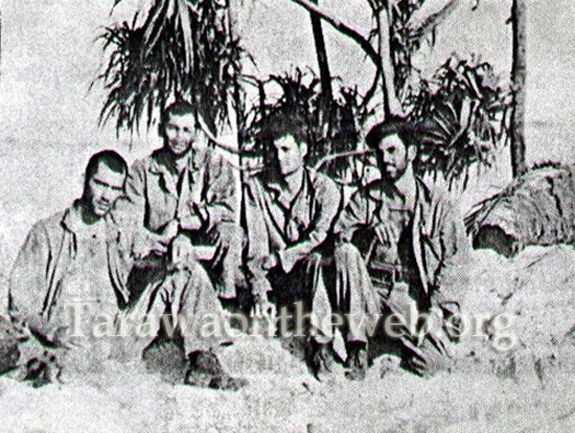By Sgt. Pete Zurlinden, Marine Corps Combat Correspondent
Marine Corps Gazette, 1944
More than 100 men were treated in a "pill-box" hospital during the first 36 hours after Marines struck Tarawa. Of the entire group, only four men died.
Despite the fact that Japanese snipers were hidden in the pillbox at that time, Lt. Herman R. Brukardt, U.S.N.R. (Medical Corps), and three indefatigable corpsman worked the entire stretch without sleep, administering to fallen Marines. Pharmacist's Mate First Class Robert E. Costello said that shortly after Marine snipers had cleared the pillbox of the machine gun group, Lt. Brukardt and his men moved in and began their grim task immediately.
"We used up four flashlights during the first night," reported Pharmacist's Mate Second Class James R. Whitehead "and about an hour after we'd been working like fury with the first wounded, Japs sneaked in. We were so busy we didn't notice it until one of the walking wounded fired a shot into a corner. It's a wonder we didn't ruin the lad we were working on, so startled were we at the rifle report.
"Then before we started working again, Marines dragged a sniper's body out of the pillbox and we all made a close inspection. We found one other and a Marine smashed him on the hand with a rifle butt."
The little pillbox hospital was situated directly on the front lines the first two days of the brief but bitter Tarawa fighting. But despite the fact that constant Jap machine gun bullets thudded in the little doorway, the naval crew refused to relax its efforts to save Leatherneck lives.
"We had so many casualties standing around that we had to keep them outside, where they deployed to keep out of enemy fire," said Lt. Brukardt "Then, when we would be ready for one, we'd hollar out, 'Next,' and they'd come scooting across the clearing and barge in the door on the double." Many Marines, with slight wounds, remained around the pillbox for hours helping the more serious cases in to the doctors.
"I've never seen a man with more sheer nerve and a real ability to bring a human life from the brink of oblivion back to safety," marveled one of these, referring to the Navy doctor. "The man performed feats of surgery that were miraculous, and the record of that scantily lighted pillbox stands to confirm my own opinion," he added.
Lt. Brukardt, a black-bearded, bespectacled wisp of a man, looked all in when I found him the next day, still at work, this time at a shore aid station where sniper victims were being brought in. "My only regret," he said, "is that we didn't have enough medical supplies in that place to save those four who died."
He then reported that the wounded Marines he attended were, "the bravest youngsters I've ever seen. They were torn and shattered by all type projectiles, but most of them were calm and quiet when we got to them. When our anesthesia gave out, I had to perform some painful operations, but very few of them let out a whimper."
Betio Island: November 23, after 76 Hours of saving lives.
Left: to right:
PhM1/C Herbert "Buck" Estes, Lt.(MC) Dr. Herman Brukhardt MD, PhM2/C James Whitehead, and PhM1/C Robert "Bob" Costello.
Send an Email:
copyright 2001 Wheaton, Illinois
Created 3 May 2001 - Updated 3 August 2015

